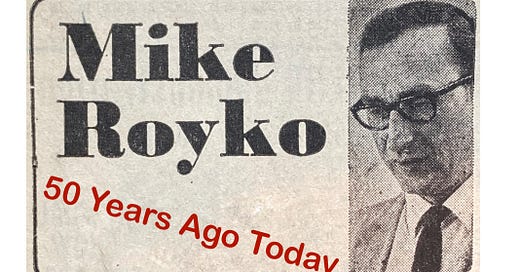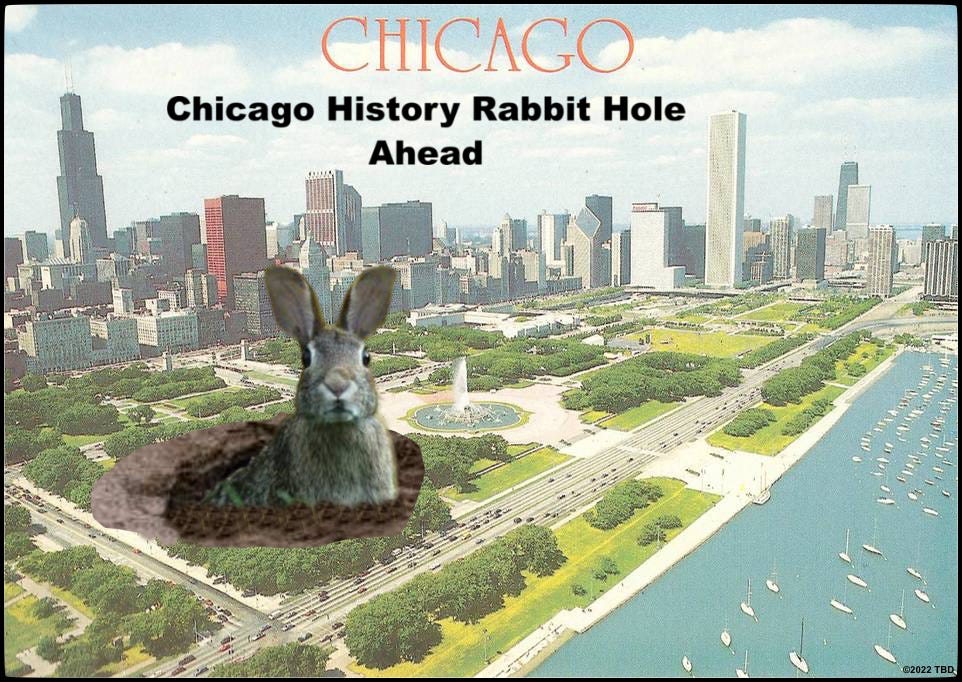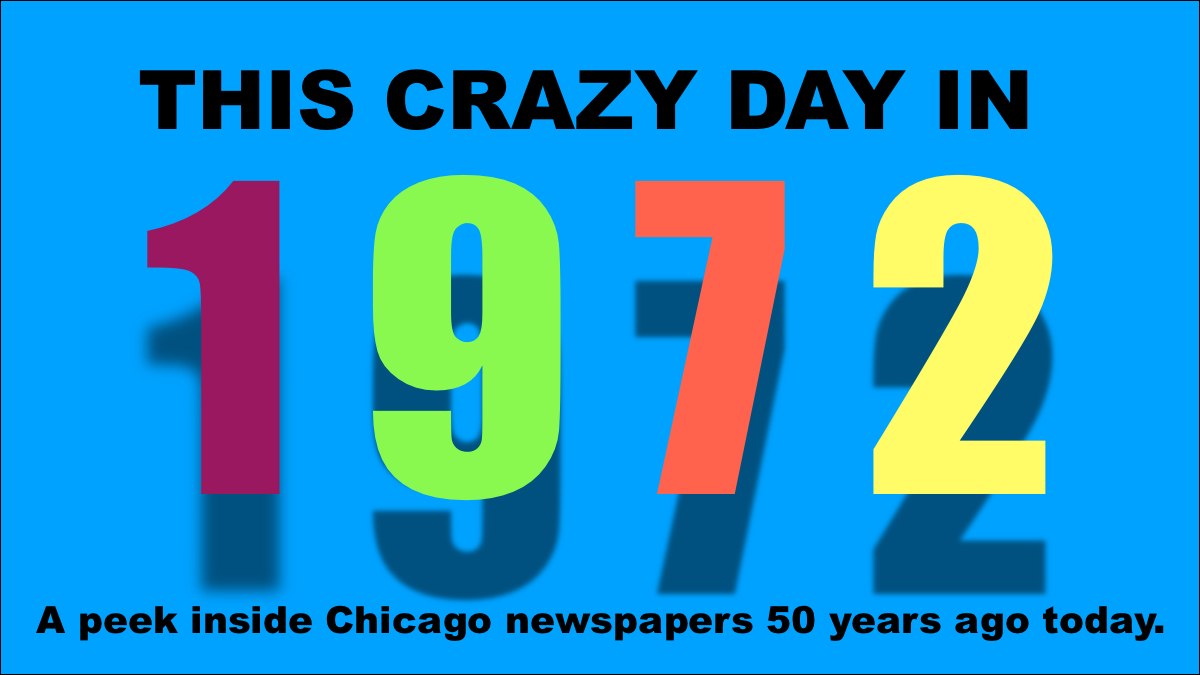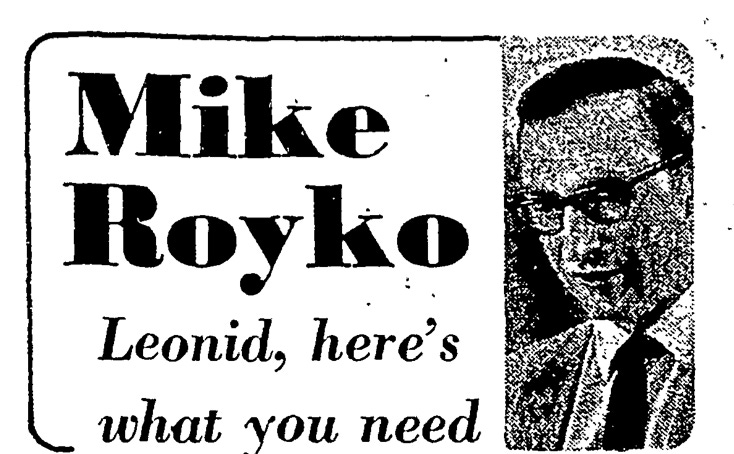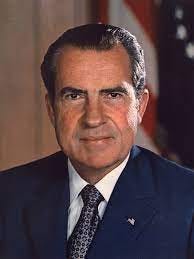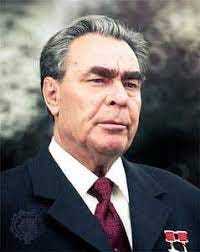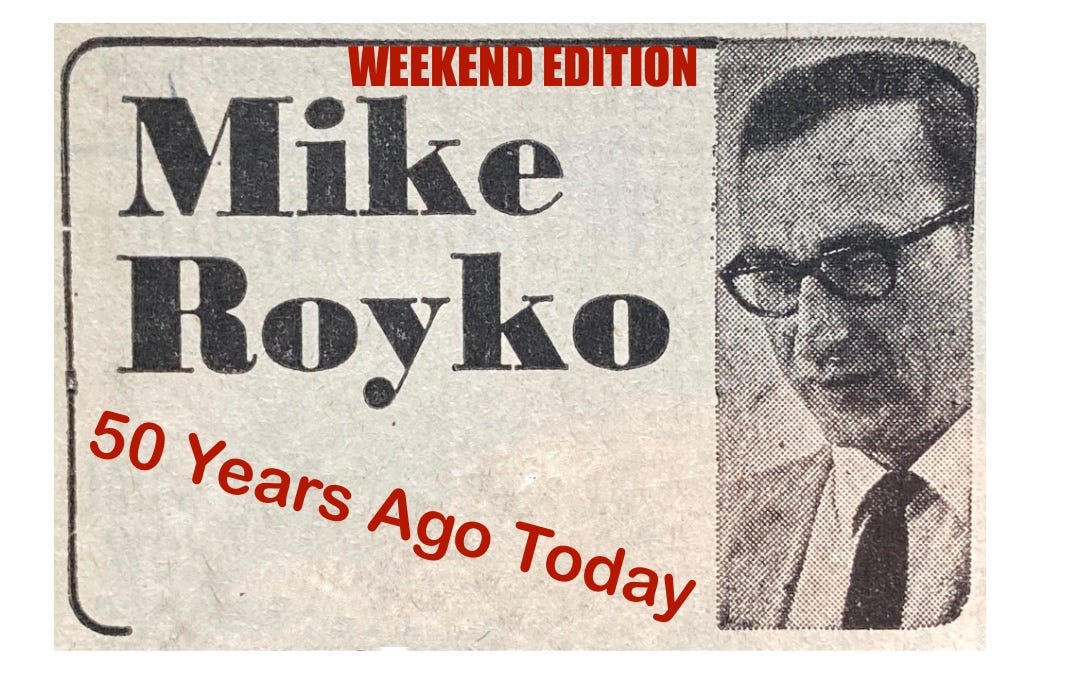Mike Royko 50 Years Ago Today: Nixon gives Brezhnev a Cadillac Eldorado
Weekly Compilation May 29-June 4, 1972
To access all site contents, click on the rose icon in the upper left corner or HERE.
Why do we run this separate item, Mike Royko 50 Years Ago Today? Because Steve Bertolucci, the hero of the serialized novel central to this Substack, “Roseland, Chicago: 1972,” lived in a Daily News household. The Bertoluccis subscribed to the Daily News, and back then everybody read the paper, even kids. And if you read the Daily News, you read Mike Royko. Get your Royko fix on Twitter too— @RoselandChi1972.
Check out the Weekend Edition—last item—and jump down the rabbit hole.
May 29, 1972
No Mike! No Daily News at all today—the paper went fishing for Memorial Day.
May 30, 1972
“There is nothing the Daley Machine likes better than a real family man.
“So the Machine should be very pleased with Richard Martwick, who was elected in 1970 as the Cook County superintendent of schools.
“Mr. Martwick has shown that he is a real family man by loading his payroll with members of his family.
“He also has provided well-paying jobs for many of the people who helped him in his upset victory.”
That includes four relatives on the 28-person “Professional Staff” roster. Martwick’s wife makes $9,804 as his administrative assistant, which is $66,177 in 2022 money.
“Shortly after the Martwicks were married, about five months ago,” Mike notes, “a reporter found Mrs. Martwick sitting at her desk, writing ‘thank you’ wedding notes while watching a soap opera on a desk TV.”
Mike details the family connections that got Martwick into this job and his former jobs—via his brother, a member of the Cook County Democratic Central (Machine) Central Committee as the Norwood Township committeeman.
Martwick had what must have been an uncomfortable interview with Mike or a legman for this column, explaining the so-called credentials of all the relatives and Machine stalwarts working as assistant school superintendents and administering high school equivalence tests.
“Martwick denies that anybody in his office was hired through political or family clout.”
“It is good that all of these friends and relations happen to be highly qualified, and their applications were accepted by Martwick,” Mike concludes. “Now they can see each other every day. People shouldn’t wait until funerals and weddings to have family reunions.”
If you dig Mike Royko, you’ll want to see the news he’s writing about. Check it out here!
May 31, 1972
The gift exchanges between President Nixon and the Soviets didn’t take over the news like the Chinese pandas did earlier this year.
If you follow THIS CRAZY DAY IN 1972, you’ll know zoos across the country fought for those pandas. Here, Brookfield and Lincoln Park Zoo were at each other’s throats over who deserved the pandas more. The pandas ultimately went, of course, to D.C. (See Feb. 24 and Feb. 25 in particular for the panda background, also Feb. 28, March 1 here, March 7 here, and March 13 here.)
But apparently President Nixon gave Leonid Brezhnev a Cadillac Eldorado on his historic trip to Russia. The Eldorado really sparks Mike’s imagination.
“The only thing wrong with President Nixon’s gift to Chairman Leonid Brezhnev—a Cadillac Eldorado—is that he didn’t go far enough.
“You shouldn’t give a man a Cadillac Eldorado without including the many things that go with ownership of such a car.
“I’m not talking about the standard accessories, such as stereo tape cassette, air conditioning, full power, and so on. The car has all of them.
“I am referring to something like a box of long, black cigars.
“Almost every Eldorado driver I’ve ever seen has been equipped with a long, thick cigar, sticking out of his face.
“I don’t think they can drive unless they have one. They aim the cigar in the direction they wish to go, and they let the car follow it.”
Mike covers everything an Eldorado driver should have, which Nixon should have given Brezhnev—like better suits, since most Eldorado drivers “dress like Dean Martin or Johnny Carson”.
And:
“Mr. Nixon should have provided Brezhnev with an $8 razor haircut. Brezhnev’s hair looks like it was cut by his wife. If he ever pulled up in front of Fritzel’s looking that way, people would think the car was stolen.”
I suppose Mike had Friztel’s on his mind since the then iconic restaurant at State and Lake was closing for good on Friday. See June 3-4 in this week’s TCD1972 for Robert Billing’s ode to Fritzel’s in the Daily News.
June 1, 1972
“The response to my crusade to legalize the ownership of machine guns, land mines, bazookas, and other such weapons has been most gratifying,” Mike starts today.
If you missed Mike’s May 22 column responding to the George Wallace assassination attempt, check that out here for background on Mike’s approach to gun control.
“Although a large number of readers thought my idea was satire, directed at the familiar arguments of the gun lobby, many others said they wanted to join my new organization, the National Machine Gun Assn.”
Mike quotes from one of the many letters he’s received, from a Mr. A. H. Pannebaker: “We don’t need any more laws…If they would take guys like the one who shot Wallace and publicly shoot him or hang him in the public square, they could put a stop to this kind of thing….Keep up the good work.”
Mike says it’s easy to join his group. Just raise your hand, “look up at the sky, and say: ‘I do here and now declare that I am a member of the National Machine Gun Assn., rat-a-tat-tat, rat-a-tat-tat, rat-a-tat-tat.’”
From time to time, Mike says members will be asked to join in crusades like his proposal “that passengers be allowed to carry guns on all airline flights.
“It is ridiculous that a hijacker can have a gun on an airplane, but not a decent, honest citizen….By permitting any passenger to carry a gun—and maybe even loaning guns to those who don’t have their own, as they are boarding—the passengers would have a fighting chance against hijackers.”
This week alone, there were two major hijackings. Check out June 3-4 here.
Also: “If World War III broke out while you were in the air, wouldn’t you want a chance to defend yourself against attacking MIGs by blasting away at them from a window in the coach lounge?”
June 2, 1972
Today Mike revisits the subject of an earlier column, William Flowers, who was a firm atheist until a couple of years ago when all his efforts to avoid being drafted into the Vietnam War seemed about to fail.
Flowers was waiting for another medical exam that would probably send him into the Army. “So I prayed,” he told Mike. “I sat in that chair and prayed that I be saved from the Army.”
When he entered the exam room to get his eyes tested, the doctor said, “You have double vision, don’t you?”
Flowers agreed he had double vision, the doctor flunked him, and he was saved.
“He immediately gave up smoking and drinking and swearing, and he cast aside his ambition to become a disk jockey,” Mike recounts. “He joined a church and began preaching sermons about how he had been saved from the draft by prayer, and a miracle that made him see double.”
Now William Flowers has contacted Mike again to say he’s had another “remarkable experience.”
“It happened when he was delivering the eulogy at the funeral of a Democratic precinct captain from his ward,” writes Mike. Flowers looked up and saw Corneal Davis in the audience— “a big Machine politician from the South Side.”
Flowers had once had a dream about Corneal Davis, in which they went for a ride in a car together. Flowers knows now what the dream meant:
“I decided that dream meant that the Lord wants me to fill the vacant post in the City Council of Fred Hubbard.”
Fred Hubbard represented the 2nd ward until recently. See here for more details, but Hubbard disappeared on May 20, 1971 when about $100,000 went missing from the federally-funded Chicago Plan, where Hubbard was the $25,000/year executive director. Chicago Plan was supposed to get Black Chicagoans into construction trade jobs. Hubbard’s seat was finally ruled vacant in March 1972, and a special election will be held to fill it.
But Corneal Davis and the Machine did not slate Flowers to run for Hubbard’s vacant seat as the official Democratic candidate. Flowers is going to run as an independent instead.
“I wished Flowers luck, but I didn’t really mean it,” Mike concludes. “I’m sure that spirit didn’t save him from becoming a disk jockey, only to have him turn into an alderman.”
Corneal Davis was a Black Chicago politician who earned the adjective “legendary” long before he died in 1995 at age 94. He served as an Illinois state representative 1943-1978, representing the South Side’s 22nd district, including as assistant majority leader. Then, he became a member of the Chicago Board of Election Commissioners.
Davis came to Chicago from his native Vicksburg, Mississippi. Per his Tribune obituary by Kenan Heise, he fled Vicksburg “after a series of lynchings, including that of a boyhood friend that he witnessed.”
Tribune columnist Vernon Jarrett, also African-American, talked with Corneal Davis in 1982 for a column about then-Mayor Byrne and whether Chicago’s Black community would run a candidate against her in the next election. Jarrett called Davis “a living lexicon of Chicago politics.” Davis “is considered dean emeritus of Illinois legislators,” wrote Jarrett, and “known among friends as ‘the Deacon.’”
Davis “earned the nickname ‘the Deacon’” through his work as an assistant minister at his long-time Chicago church, Quinn Chapel AME Church, according to his Defender obituary by Bill Clark.
“Initially a Republican, Davis later helped form the nucleus of the Chicago Democratic Party that has run the city since he and the city’s first Black congressman, William L. Dawson, ‘jumped ship’ in the 1930s, leaving the GOP to form the 2nd Ward Democratic Organization,” wrote Clark. “It has borne such politicians as U.S. Congressman Ralph Metcalfe and the late Mayor Harold Washington.”
Regarding switching parties, wrote Kenan Heise in the Tribune, Davis said, “They [the Republicans] can’t sell us Lincoln—he’s dead and we know he’s dead.”
The Chicago Daily News runs a daily in-depth article by various reporters called “Insight.” Insight focused on Davis in 1975, but for some reason the archive will only show me the second half—so I don’t know who wrote it, and missed the beginning. But it included a great interview with Davis covering his own civil rights struggles, and his civil rights work in the Springfield legislature:
“At the University of Illinois in Champaign-Urbana, blacks were not allowed in dormitories or admitted to medical school. Davis knew the key: Cash. He and a black colleague in Springfield, who was chairman of the House Appropriations Committee, threatened to hold back state funds for the university.
“‘We just told them we’d cut off all their dough,” Davis said with a chuckle.
In Springfield, he waited 12 years to get a room in the St. Nicholas Hotel. Until that happened, black lawmakers stayed at private homes of blacks.
“I just mingled with the crowd waiting to register one night at the St. Nick, and got in. When they found out who I was, they knew I’d sue if they tried to throw me out,” said Davis. “But they told me, ‘Now that you’re in, it’s OK. But don’t go downstairs to eat in The Glade restaurant.’
“It was one of the first things I did,” he said with another chuckle.
In 1975, the News noted that Davis had lived at 3223 S. Calumet for almost 50 years with his wife, Elma. Their daughter Yvonne was living in Connecticut at the time, and his grandson was attending Harvard’s business school.
As we here all know, weekends could be sad for a Daily News family because Mike Royko wasn’t in the Daily News’ single weekend edition. So we look for Mike elsewhere on weekends.
Last week, Newton Minow mentioned Mike in a letter to the Daily News. Minow was a Chicagoan, now most famous for having called television programming “a vast wasteland” in his capacity as FCC chairman in 1961. In 1972, Minow is a trustee of Chicago’s public television station, WTTW, Channel 11.
Here’s how Minow’s letter came about.
Mike wrote on May 18 about the first televised City Council meeting, broadcast by Channel 11, which planned to continue the practice. I don’t know precisely when that ended, but it was a dim memory by the ‘90s.
Mike wasn’t impressed by the commentary of Ch. 11’s anchorman, then-prominent journalist and commentator John Madigan. Mike didn’t name Madigan. The papers of this period generally have a protocol against naming competing newspapers or reporters. I can’t help but think sometimes, as in this case, it’s also a way for a columnist to diss a competitor. Like they’re not even worth naming. I could be wrong, of course. Mike knew his contemporaneous readers all understood who he was talking about, so he didn’t have to use the anchor’s name. But if Mike wanted to name Madigan, he could have—he names Walter Jacobson when he wants to, for instance.
In any case, on May 18 Mike wrote, “The anchorman sat in his glass booth and talked of parliamentary procedure, Robert’s Rules of Order, and such niceties. They are as relevant to the Council as the Queensbury Rules of Boxing are to a back-alley mugging.”
Mike felt John Madigan missed all the good stuff at the Council meeting—which Mike hilariously detailed in his May 18 column.
John Madigan was a veteran Chicago newsman. As his 2012 Tribune obituary noted, he started out as a copy boy in the ‘30s, served in World War II, and went to the Chicago American as a reporter when he got home. After a later stint in Washington for Newsweek, Madigan returned to Chicago at WBBM. He worked as news director for Channel 2 , and helped convert WBBM-AM (780) to an all-news station. Madigan then served for years as WBBM-AM’s political editor and commentator. He was also the father of actress Amy Madigan.
Newton Minow didn’t mind Mike Royko’s jabs at John Madigan—or if he did, he knew better than to let on in his letter to the Daily News. But Minow was furious about Daily News TV critic Norman Mark’s swings at Channel 11 for picking Madigan to begin with.
On May 17, the day of the Council meeting, Norman Mark devoted his entire column to excoriating Channel 11’s anchorman choice. The column was written before the broadcast. A few choice bits:
“At 11 a.m. today, Channel 11 (WTTW) began live coverage of the City Council, which is run by Mayor Daley.
“John Madigan, long an outspoken defender of Mayor Daley, is the anchorman for that coverage.
“If you find that shocking, you haven’t lived in Chicago very long.
“Local journalists heard the news and merely laughed.”
Mark reported that he’d called Madigan for comment, but Madigan said he was “busy” and wouldn’t talk.
“Jay McMullen, Chicago Daily News City Hall reporter, cannot recall ever seeing Madigan at a City Council meeting, although McMullen is one of the younger reporters on the beat,” wrote Mark. “He has been there only 18 years.”
McMullen, Mark noted, once wrote after a Madigan interview of Mayor Daley that he “could qualify as one of the mayor’s cheerleaders.”
“One of the few people to find some good in the news of Madigan’s new job was Ald. Leon Despres, no friend of the mayor”—
— “who said, ‘Let’s be thankful that WTTW didn’t hire Howard Miller.’”
Howard Miller! Howard Miller is the original Rush Limbaugh. He was off radio for almost a year, though still doing his Channel 32 TV talk show. In April 1972, Miller sprang back on the air waves doing WMAQ’s morning drive. Mayor Daley called in for Howard’s first show, and Howard said, “Mister Mayor, it’s pretty early in the morning to ask anyone to be profound, although I’m inclined to think you’re profound 24 hours a day.” For more see Mike’s Howard Miller column on December 13, 1971.
Norman Mark suspected that City Hall had basically dictated that if WTTW wanted to air Council meetings, they had to use an approved, friendly anchor. WTTW’s general manager denied it.
Mark also wrote that WTTW waited until after a fund-raising auction to announce Madigan’s job—because it “might not have been supported quite as handsomely had it been known that Channel 11 intended to become the Total Voice of the Establishment.”
See Newton Minow’s scathing letter below from the May 22, 1972 Daily News, and enjoy his Royko mention.
Coincidentally, Chicago Today political reporter Joel Weisman (who would become a Chicago fixture for decades) wrote a column on May 28 just reaming John Madigan. I didn’t have room for it in THIS CRAZY DAY, but given Norman Mark’s assessment of Madigan, and Newton Minow’s attack on Norman Mark and defense of John Madigan, the Weisman column is quite relevant here.
“The following is a tale of two veteran political reporters,” wrote Weisman. “One is John Dreiske, who retired this week as political editor of the Chicago Sun-Times. The other is John Madigan, who should be retired immediately as a political analyst for WBBM radio, the all-news station that carries Madigan’s ‘views.’”
Weisman extolled Dreiske’s worth ethic and his selfless help to young reporters. But for Madigan, Weisman pulled no punches. Here are two:
“Madigan’s analyses have one fault—they only tell one side. The side of the Cook County Democratic organization, the so-called machine.”
Madigan “once harbored ambitions for the late Barrett O’Hara’s South Side Congressional seat” so that “Madigan is commonly referred to by his peers as ‘a flak for the machine.’”
BTW, current U.S. Rep. Roman Pucinski started as a reporter, so that’s not so far-fetched. See Mike’s hilarious December 6, 1971 column on Pucinski’s time as a reporter.
What about Mike? What did he think about John Madigan in general, while we’re at it?
In a 1987 column where Mike chats with Slats Grobnik, Slats says he has a theory on why so many people are thinking of running for mayor, even with the lousy pay. Mike invites Slats to share his theory.
“OK,” says Slats, “what is the worst thing about living in Chicago?”
John Madigan?
“No, even worse than that.”
And from a 1995 column of reader’s letters:
Geraldine Lucas, Chicago: You mentioned the idiotic criticisms by the English and history professors of Studs Terkel’s Pulitzer Prize for his excellent book. But in case you missed it, John Madigan, on WBBM, made an even more vicious attack on Terkel.
To hear Madigan, Terkel barely qualified for citizenship. The sound of his voice is enough to make my flesh crawl. All he does is hiss like a snake. How did he get his job?
Comment: He auditioned by crawling in the grass and eating a mouse.
Geraldine Lucas is referring to John Madigan’s single greatest claim to Chicago fame: As mentioned earlier, Madigan served as political editor and commentator for years for WBBM-AM, 780. And every time Madigan signed off from one of his commentaries, he ended with “Newsradio Sssssssssseventy-eight!” It’s as imprinted in Chicago brains of that time as the Empire carpet jingle.
Just for fun, we’ll give the final word on John Madigan to Studs Terkel, here asked about the responding to a question about the still recently-deceased Mayor Daley in the Tribune in 1978:
“How will history regard [Mayor Daley]? It depends who writes it. If Andrew Greeley writes it or that clown at WBBM—yeah, John Madigan—then Daley will be the greatest man since Jesus Christ. He was a very strong political figure—a remarkably good bookkeeper, as Mike Royko points out in ‘Boss.’ He kept track of who owed him what….Folklore says he made the city work. But no one ever asked, ‘For whom?’”
By the way, this feature is no substitute for reading Mike’s full columns. He’s best appreciated in the clear, concise, unbroken original version. Mike already trimmed the verbal fat, so he doesn’t need to be summarized Reader’s Digest-style, either. Our purpose here is to give you some good quotes from the original columns, plus the historic and pop culture context that Mike’s original readers brought to his work. You can’t get the inside jokes if you don’t know the references. Plus, many iconic columns didn’t make it into the collections, so unless you dive into microfilm, there’s riveting work covered here you will never read elsewhere.
If you don’t own any of Mike’s books, maybe start with “One More Time,” a selection covering Mike’s entire career and including a foreword by Studs Terkel and commentaries by Lois Wille.
Do you dig spending some time in 1972? If you came to MIKE ROYKO 50 YEARS AGO TODAY from social media, you may not know it’s part of the book being serialized here, one chapter per month: “Roseland, Chicago: 1972.” It’s the story of Steve Bertolucci, 10-year-old Roselander in 1972, and what becomes of him. Check it out here.
To get MIKE ROYKO 50 YEARS AGO TODAY in your mailbox weekly along with THIS CRAZY DAY IN 1972 and new chapters of the book—
SUBSCRIBE FOR FREE!

